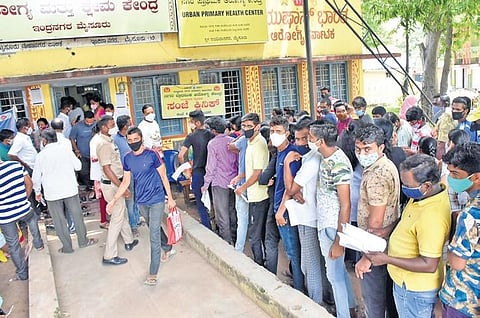

BENGALURU: Experts have given a clarion call to urgently find SARS-CoV-2 Delta Plus variant’s ‘Patient Zero’ — the first patient infected by this variant — and contact trace, test and isolate those found positive with his variant.
Experts from the genome sequencing committee said with Karnataka’s second sample with Delta Plus variant found in Bengaluru on Wednesday, it is of utmost importance to go back to the method of contact tracing, as done during the onset of Covid-19 last year.
“We have to find Patient Zero. It is very important. There is no guarantee in a random sampling that this particular person, whose sample is found with the new variant, is Patient Zero. What if he is a primary contact? We have to isolate, track and trace such people immediately,” said Dr Vishal Rao, Regional Director - Head Neck Surgical Oncology and Associate Dean - Centre of Academics and Research HCG Cancer Centre, who is also a member of the Covid-19 Genomic Surveillance Committee.
So far, genome sequencing is not included as a diagnostic process, so patients are not informed which variant they are infected with.“Sequencing is done as high-level lab research with no communication to patients. But now, looking at the situation, we have to inform patients and officials concerned. Just that the patient should not be stigmatised,” Dr Vishal added.
However, Prof Vijay Chandru, Adjunct Professor, IISc, commissioner at Lancet Citizen’s Commission, member of Karnataka’s Genome Sequencing Committee, and co-founder, Strand Life Sciences, said it can be done when infection rates are lower. “A study by NIMHANS showed how variants moved to interior parts of the state. But this can be done when the case volume is less. It is very difficult to do contact tracing when it is a random sample, and also taken for sequencing at least two to three weeks before. This is the reason why real-time genome sequencing is extremely important,” he said.
But a public health expert said when the size of samples in the variant was small, it is definitely possible. “We now have two samples for Delta Plus variant in Karnataka. We have to immediately isolate him/her, take all details like travel history, if the sample was vaccinated, trace primary and secondary contacts, test them, and even genome sequence the samples which have tested positive for this new variant,” he said.
Meanwhile, experts said India is already blamed for being slow in identifying new variants. Hence, it is important to at least rapidly interview, isolate, find the source, and warn contacts to ensure there is no Delta Plus variant driven surge.